Archive
02 November 2023
Martin van Gijzen has been appointed as the new Scientific Director of the DHPC
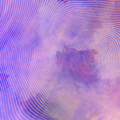
Effective September 1, Martin van Gijzen has been appointed as the new Scientific Director of the Delft High Performance Computing Centre (DHPC). Van Gijzen brings a wealth of knowledge and expertise to the centre, and he is committed to further developing the centre into a knowledge hub and go-to portal for high performance computing expertise at the TU Delft.
01 November 2023
Asterios Katsifodimos, early contributor of Apache Flink, honoured with SIGMOD Systems Award
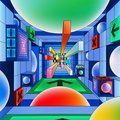
In an acknowledgement of his contribution to the world of data communications and networking, Asterios Katsifodimos, one of the founding members of the Apache Flink development team, has been awarded the SIGMOD Systems Award. This prestigious award is reserved for widely-used and impactful software that significantly influences the data communication landscape.
30 October 2023
TU Delft joins EBRAINS: advancing brain research and innovation
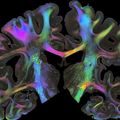
Today marks a significant milestone as TU Delft officially joins EBRAINS, a state-of-the-art digital research infrastructure developed by the EU-funded Human Brain Project, which serves as a comprehensive hub for brain-related data and tools.
18 October 2023
Andrew Webb wins Huibregtsen Award for Affordable MRI Scanners
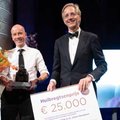
High field MRI expert, Professor Andrew Webb of the Microelectronics department, and his Ugandan collaborator, Johnes Obungoloch, have been awarded the 2023 Huibregtsen Prize. Their notable achievement is the creation of an affordable, portable, and long-lasting MRI device tailored for brain imaging in developing nations.
16 October 2023
Alliander and the PowerWeb Institute strengthen and expand collaborations
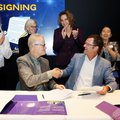
On 13 October 2023 Alliander and the TU Delft Powerweb Institute signed a letter of intent to collaboratively foster innovation to find intelligent solutions that will accelerate the energy transition and contribute to a more sustainable and greener world.
12 October 2023
TU Delft and JetBrains are launching new ICAI lab AI for Software Engineering
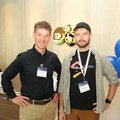
How can we engineer better software by using artificial intelligence (AI)? TU Delft and JetBrains are joining their knowledge and expertise on AI and software development in the new AI for Software Engineering Lab (AI4SE). The goal of the collaboration is to develop a deep understanding of how novel AI technologies can strengthen the effectiveness and efficiency of software engineering processes.
28 September 2023
TU Delft and the police increase joint impact
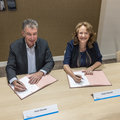
Vandaag hebben de TU Delft en de politie hun samenwerking versterkt door het ondertekenen van een samenwerkingsovereenkomst.
28 September 2023
Elena Pulvirenti receives M-grant for her innovative research on the metastability of spin systems
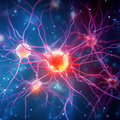
The NWO Domain Board Science has announced that Dr. Elena Pulvirenti, from the EEMCS faculty, will receive an M-grant for her impressive research on the metastability of dilute spin models. M-grants are intended for innovative, high-quality, fundamental research and studies involving matters of scientific urgency. Elena will receive 350.000 euros to invest in her research.
26 September 2023
Novel quantum algorithms for computational fluid dynamics: TU Delft and Fujitsu join forces

In a new chapter of an already fruitful collaboration, TU Delft and Fujitsu are bundling their expertise and resources over the next five years to cover new grounds in quantum computational fluid dynamics (QCFD). The project will have a special emphasis on developing novel quantum algorithms for simulating the complex behaviour of flows and testing them in the context of an aerodynamic design optimization workflow.
21 September 2023
TU Delft scientists put ChatGPT to the test

Researchers at Delft University of Technology and RWTH Aachen University have put ChatGPT’s knowledge on science and engineering to the test. By letting 198 Delft scientists evaluate GPT-3.5’s answers to questions covering natural science and engineering disciplines at the university, they found out how well the large language model can answer university level questions.
13 September 2023
HybridLabs consortium receives NWA-ORC funding for innovations in offshore renewable energy
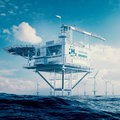
The Dutch Research Council (NWO) has announced that the HybridLabs consortium will receive 10.4 million euros in funding within the National Research Agenda programme: Research on Routes by Consortia (NWA-ORC). The HybridLabs consortium project will accelerate Dutch innovations in offshore renewable energy through data-driven hybrid labs. The consortium consists of around 40 partners and is led by the TU Delft Faculty of Aerospace Engineering, with a valuable contribution from the team Dynamic Stability of Sustainable Electrical Power Systems of EEMCS’ Intelligent Electrical Power Grids Group (IEPG).
05 September 2023
Odette Scharenborg new chair of ISCA
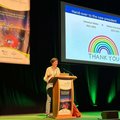
Odette Scharenborg has been appointed the new chair of the International Speech Communication Association (ISCA). ISCA is a multi-disciplinary and international organization that brings together experts in language and speech from all over the world, ranging from linguistics and psychology to computer engineering. With over 3000 members from both academia and business, including major tech organizations, ISCA plays a crucial role at the forefront of research into speech and speech technologies. Vital research without which Siri for instance wouldn't function.
04 September 2023
Clementine Boutry receives ERC Starting Grant for groundbreaking research on biodegradable implants
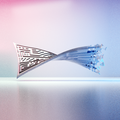
The European Research Council (ERC) has announced that five young scientist from TU Delft will receive ERC Starting Grants. One of these scientists is Dr. Clementine Boutry, from the EEMCS faculty, who has received this prestigious grant for her groundbreaking research on biodegradable implants that can repair nerves.
25 August 2023
Fujitsu and TU Delft explore the horizon of High Performance Computing
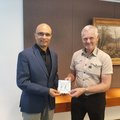
In an era where computing power continues to grow at an exponential rate, the importance of high-performance computing (HPC) cannot be understated. Leading the charge in the HPC market is Fujitsu. This week, Professor Kees Vuik, chair of Delf High Performance Computing Centre, visited Fujitsu's headquarters to meet with the CTO Vivek Mahajan, discussing the future of HPC and potential applications of quantum computing.
17 August 2023
A digital twin of the entire EU electricity grid is within reach

It is vital to the increase the reliability of the European electricity system. The electricity grid needs to be ready for a drastic increase of renewable energy and more resilient to future shocks (such as cyber-attacks). That is why 77 partners, from 15 European countries, have come together through the TwinEU consortium project to create a digital twin of the entire European electricity grid. TU Delft is one of the prominent partners within this project and is very excited to have won the grand proposal together with all the leading stakeholders.
03 August 2023
Six promising young EEMCS researchers receive Veni grant

The Veni grant is a funding instrument from the Talent Programme of the Dutch Research Council (NWO). It allows researchers who have recently obtained their PhD to conduct independent research and develop their ideas for a period of three years. The Veni grant amounts to a maximum of EUR 280,000. A total of 17 researchers from TU Delft received a Veni, including 6 promising young researchers from the EEMCS faculty. A fantastic achievement by these researchers!
31 July 2023
TU Delft Aims for Lunar Exploration with Moonshot Program
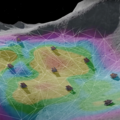
The Delft Space Institute is taking significant steps towards lunar exploration by investing 200K Euros into the Moonshot program; an initiative that seeks to advance science and technology solutions for lunar surface missions. Researchers and students from diverse faculties will join forces to pursue this shared goal.
11 July 2023
EEMCS Secures Participation in Six Dutch 'Groeifondsen' (national Growth Funds)

By participating in six of the eighteen prestigious Dutch 'Groeifondsen', the faculty of Electrical Engineering, Mathematics and Computer Science (EEMCS) has strengthened its commitment to a sustainable and responsibly digital future. With these funds, the Netherlands' positions in sectors such as 6G technology, complex microelectronic communications systems, battery technology, and sustainable solar panel production will be consolidated, spearheading the development in these critical areas.
07 July 2023
Extra-resilient crops through integration of plant biology, simulation models and AI
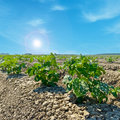
The Netherlands Organisation for Scientific Research (NWO) announced its contribution of 15 million euros to PlantXR, a CropXR research programme into 'smart breeding' of extra resilient crops (eXtra Resilient, XR). This impulse brings CropXR's total budget to over €90 million for the next 10 years. NWO’s grant marks the start of the new Dutch institute CropXR, which integrates plant biology, computational modelling, and artificial intelligence into 'smart breeding methods'. Those will be used to develop crop varieties that are more resilient to climate change and less dependent on chemical crop protection. In CropXR, TU Delft works together with Utrecht University, Wageningen University and Research, the University of Amsterdam and dozens of plant breeding, biotech and processing companies on basic scientific research, data collection and data sharing, education, and advancing broad application of the results.
04 July 2023
Enrol in the Massive Open Online Course on Gender Equality in the Clean Energy Transition
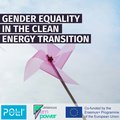
A sustainable future is the only future. That is why the energy transition is so important. It is a worldwide, structural change to reshape energy production and shift away from fossil fuels, towards clean sources like hydro, wind and solar power. But even though this transition is a movement at the forefront of change, it is still lacking in certain areas. Most notably, women are significantly underrepresented in the energy sector and transition. TU Delft, together with many international partners, are working on solving this issue within the FemPower project and trough the Massive Open Online Course (MOOC) on Gender Equality in the Clean Energy Transition.
29 June 2023
Navigating the Uncharted Waters of Fluid Mechanics

Fluid mechanics, the scientific study of how liquids move and interact, plays an indispensable role in advancing our scientific understanding of the world around us. It is part of the bedrock upon which many areas of science, from physics and engineering to medicine and even ecology, are built. As it stands, science has already deciphered much of its intricate landscape. Yet, many open problems continue to be a frontier of uncharted knowledge, part of which Manuel Gnann’s Vidi research aims to explore.
13 June 2023
New Director of Delft Cleanrooms
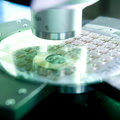
The Faculty of Electrical Engineering, Mathematics and Computer Science is pleased to announce that Pieter Telleman has started as Director of Delft Cleanrooms starting from May 1st. Initially, he will work part-time alongside his current job at MESA+ in Twente, but will be available full-time for this position from August 1st.
31 May 2023
Chips that mimic the brain's adaptability and efficiency
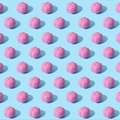
Our world knows more and more supercomputers. But do not be mistaken: the most efficient – and perhaps more importantly: the most flexible – computing is done in the brain, human or otherwise. So what can we learn from how the brain computes? Charlotte Frenkel, recently recognized by NWO as one of the Netherlands' biggest AI talents and thus officially an ‘AiNed fellow’, intends to find out. This new grant allows Frenkel to start a team to research the possibilities of neuromorphic computer chips, inspired by the neocortex area in the brain.
24 May 2023
Learning to Run a Power Network (L2RPN) Delft 2023 competition
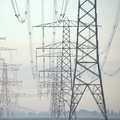
TU Delft is organizing the “Learning to Run a Power Network” (L2RPN) competition 2023. L2RPN is a series of competitions designed to train an Artificial Intelligence (AI) agent to operate a power network. The L2RPN Delft 2023 competition offers an exciting and exclusive opportunity for students and researchers in the Netherlands to test their AI solutions against others in a realistic and challenging environment, collaborate with fellow innovators, and win prizes up to €1500.
24 May 2023
The link between artificial intelligence (AI) and software engineering

Developments are rapid around data, algorithms, machine learning and artificial intelligence (AI), especially since the launch of ChatGPT late last year. Software engineering is highly relevant here, because AI systems are essentially made up of software, and also because the two fields influence each other. A conversation about the relationship between AI and software with Geert-Jan Houben, pro-vice rector of AI, Data and Digitalisation, leader of the TU Delft AI Initiative and professor of Web Information Systems, and Arie van Deursen, professor of Software Engineering at TU Delft's Faculty of Electrical Engineering, Mathematics and Computer Science (EEMCS).
17 May 2023
A new frontier for Agrivoltaics: the launch of the SYMBIOSYST project
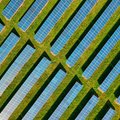
Building a world wherein solar energy and agriculture can have a mutually beneficial relationship
11 May 2023
TU Delft and TenneT present solutions for sustainable and stable energy systems during joined symposium
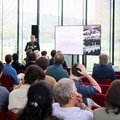
Electrical power grids worldwide are becoming overloaded. This makes it essential to further develop solutions to ensure the stability of our increasingly sustainable energy system. TU Delft is proud to work at the forefront of renewing energy systems, together with industry partners like grid operator TenneT. During a symposium on the topic of net congestion and innovation, experts from the industry and academia presented their joined efforts in this field.
10 May 2023
Extreme Weather Phenomena: PHARA's 3D Radar Aims to Better Understand Them

Violent storms and heavy rains are becoming an increasingly pressing concern in today's world, with climate change posing ever greater risks for society. In the Netherlands alone, it is estimated that extreme weather will result in €745 million in damages per year. Yet, one of the biggest problems with extreme weather events is that we still poorly understand them. Thanks to the new PHARA project, funded by NWO for €3.5 million, this could be set to change. PHARA aims to create a 3D weather radar, which would be the first of its kind to measure the growth process of cloud particles.
08 May 2023
TU Delft focuses on battery of the future

A major challenge in the energy transition is the efficient and flexible storage and transportation of renewable energy. Batteries will play an important role in this. However, much research and innovation are still required. In order to encourage this, on Thursday 11 May 2023 TU Delft will be launching e4BatteryDelft: a brand-new platform that will focus on electrochemical storage of renewable energy – with respect for the world around us, in a way that is affordable and also totally European.
04 May 2023
A breakthrough that makes solar panels better than ever
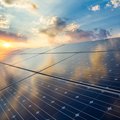
Solar energy is the cheapest and most accessible form of energy. Now, it will be more efficient than ever.
18 April 2023
Peter Palensky appointed head of Electrical Sustainable Energy department
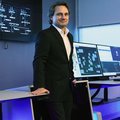
The Faculty of Electrical Engineering, Mathematics and Computer Science is proud to announce that Professor Peter Palensky has been appointed as the new Head of the Department of Electrical Sustainable Energy. He will start his term on July 1. Peter Palensky brings with him a wealth of experience in the digitalisation of the energy grid: a crucial aspect of the ongoing energy transition.
18 April 2023
Paving the way for secure and private financial crime detection

This spring, the US and UK governments jointly hosted the ‘Summit for Democracy’ – aimed at promoting and protecting democratic values. A part of this summit was the PETs Prize Challenge, designed to develop privacy-enhancing technologies to protect users in our data-driven society whilst also tackling the challenges of that increasingly digital society, such as financial fraud. In this international competition, the team of TU Delft won the second prize, developing the most effective model for detecting financial fraud such as money laundering.
31 March 2023
Creating a Future-Proof Port: The FORT-PORT Innovative Approach to Fighting Crime
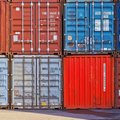
Organized crime is one of the bigger societal challenges of today, especially in ports such as Rotterdam. In order to develop scientifically tried and tested methods to tackle this multi-faceted problem, NWO has funded a new project: FORT-PORT. Led by the Law faculty of the Erasmus University Rotterdam, the project will receive critical support from data scientist Huijuan Wang (Department of Intelligent Systems) and mathematician Robbert Fokkink (Delft Institute of Applied Mathematics) at EEMCS. The interdisciplinary and multi-university project will be a first of its kind, and an excellent example of how emerging Digital Technologies can help protect valuable aspects of our society.
27 March 2023
Delft University Fund launches new campaign: Tech for Impact
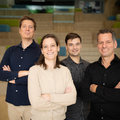
How can we make physical jobs more attractive? Can we speed up research on dementia? Can we make our campus an example of sustainability? And will ambitious students succeed in making seaweed aquaculture more sustainable? These four questions are at the heart of the new campaign of Delft University Fund: Tech for Impact 2023.
10 March 2023
AI for the Energy Transition: an Hackathon
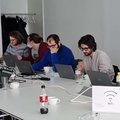
From suggesting a better topological configuration of the energy grid, to detecting anomalies in the energy trade and suggesting more efficient energy trading strategies: there are countless ways in which AI can help streamline the energy transition. In fact: these are just the first three research directions Jochen Cremer and his team are investigating together with the Austrian Institute of Technology. To find out what other green pastures lie beyond these three approaches, this week TU Delft organized a Hackathon, together with the Austrian AIT.
08 March 2023
AI to guide Science & Geometric Deep Learning of Surfaces

On March 8 the NWO Domain Board Science has approved nineteen grant applications in the Open Competition Domain Science-M programme, two of which for projects within EEMCS. Sebastijan Dumancic will research how Artificial Intelligence (AI) can help scientists with discovering explanations for natural phenomena. Klaus Hildebrandt will work on geometric convolutional neural networks to see how they can help solve difficult problems in surface analysis and processing. Although already existing, these methods are still under development and need to be further developed before they can be widely used in practice.
02 March 2023
Accreditation for new Master’s Degree in Quantum Information Science & Technology
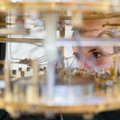
On 16 February the Netherlands-Flemish Accreditation Organisation (NVAO) accredited the Master's degree in Quantum Information Science & Technology (QIST). With this accreditation, the new programme can officially kick off in September 2023. The Master’s programme is a collaboration between TU Delft (AS, EEMCS and QuTech) and Leiden University.
28 February 2023
TU Delft presents the eight best Climate Action & Energy Papers

Record temperatures, floodings and melting sea ice: radical weather events are becoming more frequent and have a devastating effect on our planet and our lives. By accelerating the energy transition and climate action TU Delft, together with its partners, tries to prevent climate change and contain its consequences. With the election of the Best Climate & Energy Paper, TU Delft is highlighting a number of large and small innovations that contribute to this.
23 February 2023
Stephanie Wehner receives NWO Vici grant for innovative research line
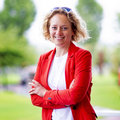
23 February 2023
Kofi Makinwa recognized as Top Contributor at "Chip Olympics"
